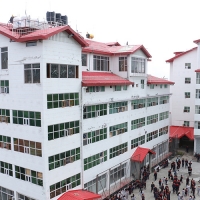Roots Country School in Shimla, Himachal Pradesh Admission, Fees Structure

Where is Roots Country School ?
Roots Country School is Located in Shimla , Himachal Pradesh, India
Address of Roots Country School, Shimla
Tehsil KOTKHAI,
Distt. SHIMLA – 171225
(Himachal Pradesh)
How do I contact Roots Country School?
Call at +91 -9816080233 to contact Roots Country School
About Roots Country School
The hallmark of ROOTS’ education is the school’s willingness to accept the students as they are, support them when necessary, stretch them when appropriate and inspire them to become moral leaders. Roots Country School is dedicated in providing its students some of the happiest and most secure years of their lives, help them to grow into caring, responsible & productive adults. The school provides unique features such as flexibility in curriculum, a fine focus on learning to think for oneself, unparallel Sports, recreational facilities, big playgrounds, carefully selected house parents and councillors who provide social and cultural support. The school’s programme is designed to inculcate global thinking at the same time strengthening cultural roots. Personality development with strong stress on academic performance takes an individual to the pinnacle of success. Roots Country School was a small initiative to know ourselves, our potential, our culture & our roots. The vision was to benefit the students of the hills for whom getting education was never an easy task. It was important to understand the socio-economic challenges , the ever increasing aspirations and expectations of the guardians and at the same time providing education within affordable limits. I hope that this small initiative will transform and benefit the generations to come.
Small hamlets were recorded prior to 1815 when British forces took control of the area The climatic conditions attracted the British to establish the city in the dense forests of the Himalayas As the summer capital, Shimla hosted many important political meetings including the Simla Accord of 1914 and the Simla Conference of 1945 After independence, the state of Himachal Pradesh came into being in 1948 as a result of the integration of 28 princely states Even after independence, the city remained an important political centre, hosting the Simla Agreement of 1972.
After the reorganisation of the state of Himachal Pradesh, the existing Mahasu district was named Shimla Shimla is home to a number of buildings that are styled in the Tudorbethan and neo-Gothic architectures dating from the colonial era, as well as multiple temples and churches The colonial architecture and churches, the temples, and the natural environment of the city attracts tourists Attractions include the Viceregal Lodge, the Christ Church, the Jakhoo Temple, the Mall Road, the Ridge and Annadale The city centre's northern most point is Jakhoo and the southern most location is Annadale, and the easternmost point is Sanjauli and western point is Chotta Shimla.
The Kalka–Shimla Railway line built by the British, a UNESCO World Heritage Site, is also a major tourist attraction Owing to its steep terrain, Shimla hosts the mountain biking race MTB Himalaya, which started in 2005 and is regarded as the biggest event of its kind in South Asia Shimla also has the largest natural ice skating rink in South Asia Apart from being a tourism centre, the city is also an educational hub with a number of colleges and research institutions
The predominantly mountainous region comprising the present-day Himachal Pradesh has been inhabited since pre-historic times having witnessed multiple waves of human migration from other areas Through its history, the region was mostly ruled by local kingdoms some of which accepted the suzerainty of larger empires Prior to India's independence from the British, Himachal comprised the hilly regions of Punjab Province of British India After independence, many of the hilly territories were organized as the Chief Commissioner's province of Himachal Pradesh which later became a union territory In 1966, hilly areas of neighboring Punjab state were merged into Himachal and it was ultimately granted full statehood in 1971.
Himachal Pradesh is spread across valleys with many perennial rivers flowing through them Almost 90% of the state's population lives in rural areas Agriculture, horticulture, hydropower and tourism are important constituents of the state's economy The hilly state is almost universally electrified with 995% of the households having electricity as of 2016.
The state was declared India's second open-defecation-free state in 2016 According to a survey of CMS – India Corruption Study 2017, Himachal Pradesh is India's least corrupt state